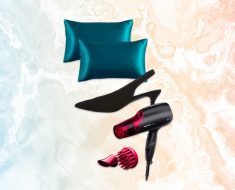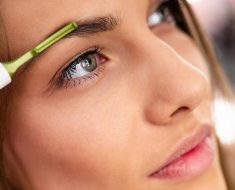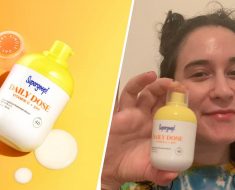Do a quick search for "drinkable collagen" on Amazon and more than a hundred results materialize, many of which feature enticing reviews from people claiming collagen supplements did amazing things for their skin. In theory, the thought of tossing back a collagen-infused beverage for a healthier complexion sounds worthy of writing home about, but it begs the all-too-blatant question: Does it actually work? Allure consulted experts to get to the bottom of it.
For starters, what is collagen and what does it have to do with skin?
"Collagen is the main structural protein in our skin," says New York City-based dermatologist Joshua Zeichner. He likens collagen to a mattress frame because, without it, the skin starts to break down — like a mattress without a frame would — resulting in fine lines and sagging.
This process is inevitable as we age because the collagen in our bodies decreases the older we get, thanks in part to environmental factors, such as sun exposure and pollution. In addition to our skin, dermatologist Yoon-Soo Cindy Bae says that collagen is found all throughout the body, although she explains that there are several different types such as I, III, IV, and VII, that are located in the skin itself.
"[These types] are integral for the structure and function of the skin," she says. Types I, II, and III, for instance, account for 80 to 90 percent of collagen in the body, so it makes sense that they would be integral to the skin's health considering it's our largest organ. Type I is the most abundant of them all and one of the main components of our connective tissue, while II is mostly found in cartilage and the eyes, and III in the skin, muscles, and blood vessels.
More on ingestible collagen
Ingestible collagen supplements, such as the kind you can pour into coffee or any beverage of your choice, began surfacing just a few years ago, with wellness brands and influencers chalking the powders up as a new miracle treatment for skin, hair, and joint health. As of right now, there are two main types on the market: marine collagen, generally from fish, and animal collagen, which can come from cows and pigs, for example. The collagen is found in the bone and tissues of these animals.
Collagen is the main structural protein in our skin.
Most of the supplemental collagen is formulated in powder form, while some others come liquified to drink. Pills and gummies are popular, too. If this all sounds familiar, chances are it's because you've seen ads about collagen floating around on the Internet and social media, as the beauty supplement market, which includes ingestible collagen, has utilized countless influencers who post about their alleged benefits on Instagram.
All this to say: It's important to take these reviews with a grain of salt, keeping in mind that while these people might very well be sharing their honest experiences, it's not the same as legitimate experts speaking to collagen's efficacy.
So, does this mean consuming collagen can benefit my skin?
Experts say it's unlikely — especially without evidence. "Despite popular belief that collagen supplements can help strengthen our skin, we have little data to truly support this," says Zeichner. "Collagen is a large molecule that is digested by our intestines into smaller pieces when taken by mouth, so when we ingest powders or supplements, our skin is not seeing the full collagen molecule, but rather protein fragments or individual amino acids." In other words, you're not reaping the full benefits of the collagen molecule because it's broken down in the body so much first.
In addition, New York City-based registered dietician and nutritionist Keri Gans brings up the flawed notion that by drinking collagen, it instantly goes to your face, thus improving the skin there. "[Collagen] doesn't know where to go in your body," she says, "It's not like that."
Gans adds that the anecdotal evidence seen in the review sections on sites like Amazon tell us very little, as she explains that people are constantly changing up their lifestyle habits (i.e. exercising more, eating better, and etc.), which she says makes it impossible to tell whether collagen is the actually skin-improving culprit.
Despite popular belief that collagen supplements can help strengthen our skin, we have little data to truly support this.
Based on the experts we chatted with, it's clear that there needs to be more scientific evidence on collagen (and how it benefits the skin). That said, take these "benefits" with some reservations because at the end of the day, they are simply marketing claims.
"[One thing] we know is that hydrolyzed collagen has antioxidant properties, so that can be beneficial, though the effects specifically on the skin remain unknown," she says. "This is why prospective clinical trials need to be conducted to evaluate their role."
Is drinking collagen bad for me?
Most likely, not, but if it's results you're after, Zeichner recommends topical — as opposed to ingestible — treatments to really see a difference. "Until we have more data, I still recommend traditional collagen-strengthening treatments like topical retinol," he says.
Bottom line: While consuming collagen is typically safe, there's currently no way to tell whether it can strengthen and benefit the skin until more solid clinical evidence is conducted. In the meantime, talk to your dermatologist to find out if you should start incorporating retinol products into your skin-care routine. After all, retinols are proven to help smooth fine lines and clear up breakouts.
Source: Read Full Article





